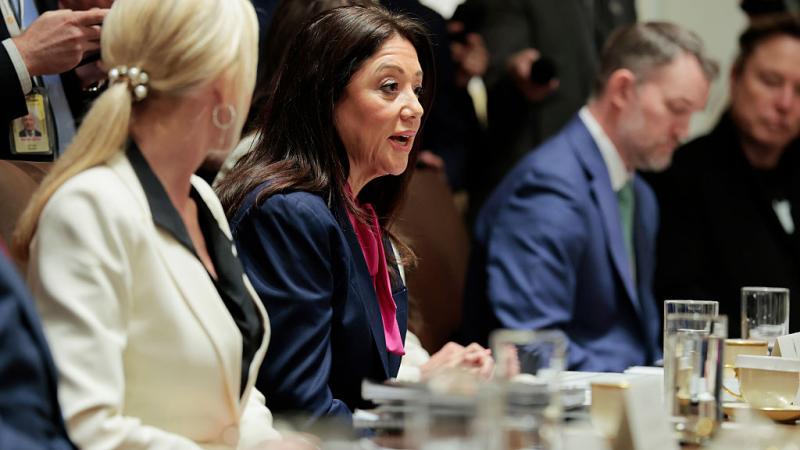Feds misquoted SCOTUS to require states to let boys in girls' restrooms, judge says
Purported "guidance" isn't optional for states that risk federal funding by waiting for agencies to "drop the hammer" on them for protecting women's sports, restroom privacy, court says.
The Biden administration likely violated federal law by issuing an executive order and guidance equating sex and gender identity without a proper rulemaking, plausibly pressuring 20 states to change their laws recognizing sex-based rights or risk losing "substantial federal funding," U.S. District Judge Charles Atchley Jr. ruled late Friday.
The preliminary injunction, issued the same day the University of Pennsylvania nominated transgender swimmer Lia Thomas as NCAA Woman of the Year, said the White House and agencies wrongly invoked the Supreme Court's ruling in a transgender employment case to justify the changes.
The ruling is a major win for Republican attorneys general led by Tennessee's Herbert Slattery, who sued the administration last summer for allegedly violating the Administrative Procedure Act (APA) by unilaterally redefining federal law to not only prohibit male-female distinctions in school sports, restrooms and locker rooms, but also compel employers to use employees' preferred pronouns.
Last year, the 6th U.S. Circuit Court of Appeals, which governs Atchley's court, prohibited a public university from compelling a Christian professor to use a student's preferred pronouns. Shawnee State University paid Nicholas Meriwether $400,000 in an April settlement.
The injunction again confirms the Department of Education (DOE) "cannot pretend a 'guidance document' is merely advisory while simultaneously threatening to enforce its terms," Joe Cohn, legislative and policy director for the Foundation for Individual Rights and Expression, told Just the News.
The civil liberties group previously challenged the department's 2011 "Dear Colleague" letter that portrayed itself as guidance while "dramatically revis[ing] how colleges and universities nationwide adjudicated claims of sexual misconduct," he said.
Atchley's ruling could also help students, parents and school employees in legal challenges to gender identity policies that are premised, explicitly or implicitly, on federal interpretations of the word "sex" and the threatened loss of funding for noncompliance.
The Alliance Defending Freedom cheered the injunction. In a motion to intervene on behalf of the Association of Christian Schools International and three female student athletes at public schools last fall, it argued the federal guidance puts the private schools at a competitive disadvantage with public schools.
Judge Atchley refused to dismiss the AGs' lawsuit, drawing contempt from the pro-transgender Human Rights Campaign as "another example of far-right judges legislating from the bench."
The Trump appointee determined the guidance documents issued by DOE and the Equal Employment Opportunity Commission in response to President Biden's January 2021 executive order "constitute final agency action," regardless of their "self-serving labels," giving him jurisdiction to rule on them.
At least 10 of the 20 states have shown both a "concrete and particularized" and "actual or imminent" threat to their ability to enforce their own laws that is "fairly traceable" to the administration, Atchley said. It's not an "abstract question" of sovereignty.
He pointed to Tennessee laws determining school sports participation by "the student's sex at the time of the student's birth" and letting students and employees sue schools that intentionally let the opposite sex into an occupied "multi-occupancy restroom or changing facility."
States are likely to show the purportedly nonbinding documents are "legislative rules" because they were issued without the APA's required notice-and-comment procedures, Atchley wrote. The administration has no "legitimate interest" in enforcing rules that are "likely to be procedurally invalid."
DOE published an "interpretation" of Title IX in the Federal Register, followed by a "Dear Educator" letter to regulated entities, that made clear it was a "change in position" resulting from the Supreme Court's Bostock decision in 2020, the judge said.
The court majority said Title VII prohibits discrimination based on gender identity because it inherently treats employees differently based on their sex, but expressly declined to extend the finding beyond Title VII.
DOE said it would "fully enforce" its new interpretation against entities that receive federal funding under Title IX, whose earliest guidance documents exempt sex-segregated facilities such as restrooms and locker rooms.
Around the same time, EEOC published a "Technical Assistance Document" regarding employers' Bostock obligations on "dress codes, bathrooms, locker rooms, showers, and use of preferred pronouns or names." It claimed the document is nonbinding but invited the public to file discrimination claims based on its interpretation.
While the agencies claim they can't be sued because they haven't enforced their new interpretations — "an inherently fact-bound inquiry" — Atchley said that's not a relevant question.
He again cited Tennessee, claiming it faces a "credible threat of enforcement" that would imperil more than $2 billion in federal education funding. The feds also filed a statement of interest in pending litigation against West Virginia, another plaintiff, citing the new interpretation of Title IX.
SCOTUS has already held that states need not wait for the feds to "drop the hammer" while accruing "potential liability" for violating federal law before enforcement, Atchley said.
The judge chided the feds for ignoring the explicit text of the Bostock decision even while citing it for support, noting the majority "explicitly refused to decide" the issue of bathrooms, locker rooms and dress codes under Title VII. The guidance documents "advance new interpretations" of two federal laws and "impose new legal obligations on regulated entities."
Schools can make simple changes to their policies while the lawsuit plays out, George Washington University law professor John Banzhaf — dubbed by CNN the "father of potty parity" for his advocacy ofmore women's restrooms — wrote in his Monday email newsletter.
After his law school converted a male restroom to an "all-gender" restroom, men didn't seem to mind biological and transgender women "viewing their backs" while urinating, or fear "being sexually assaulted" by them.
Banzhaf also said schools must make only a "reasonable accommodation" for transgender girls, such as sufficient single-occupancy restrooms, as they do for students with disabilities or "strongly held religious beliefs."
The Facts Inside Our Reporter's Notebook
Links
- preliminary injunction
- University of Pennsylvania nominated transgender swimmer Lia Thomas
- sued the administration last summer
- Shawnee State University paid Nicholas Meriwether $400,000
- Alliance Defending Freedom cheered the injunction
- motion to intervene
- pro-transgender Human Rights Campaign
- dubbed by CNN the "father of potty parity"
- converted a male restroom to an "all-gender" restroom
















